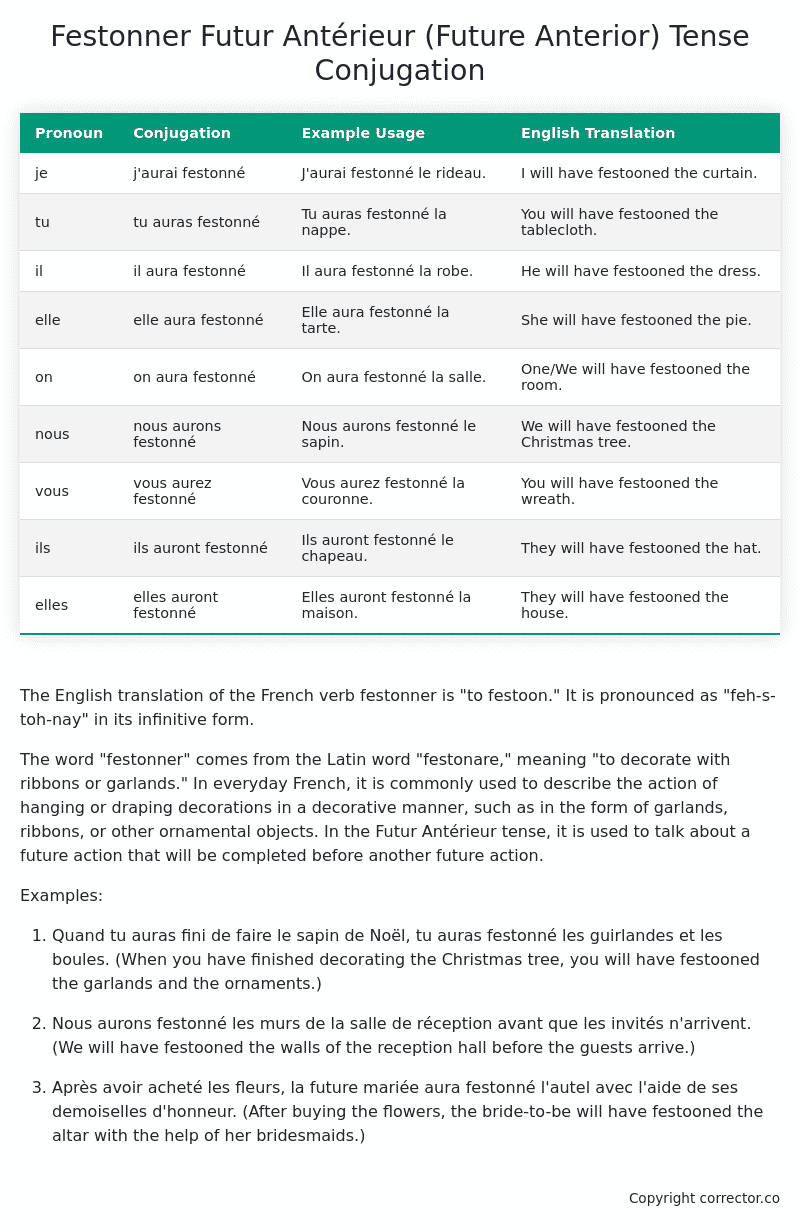Futur Antérieur (Future Anterior) Tense Conjugation of the French Verb festonner
Introduction to the verb festonner
The English translation of the French verb festonner is “to festoon.” It is pronounced as “feh-s-toh-nay” in its infinitive form.
The word “festonner” comes from the Latin word “festonare,” meaning “to decorate with ribbons or garlands.” In everyday French, it is commonly used to describe the action of hanging or draping decorations in a decorative manner, such as in the form of garlands, ribbons, or other ornamental objects. In the Futur Antérieur tense, it is used to talk about a future action that will be completed before another future action.
Examples:
-
Quand tu auras fini de faire le sapin de Noël, tu auras festonné les guirlandes et les boules. (When you have finished decorating the Christmas tree, you will have festooned the garlands and the ornaments.)
-
Nous aurons festonné les murs de la salle de réception avant que les invités n’arrivent. (We will have festooned the walls of the reception hall before the guests arrive.)
-
Après avoir acheté les fleurs, la future mariée aura festonné l’autel avec l’aide de ses demoiselles d’honneur. (After buying the flowers, the bride-to-be will have festooned the altar with the help of her bridesmaids.)
Table of the Futur Antérieur (Future Anterior) Tense Conjugation of festonner
| Pronoun | Conjugation | Example Usage | English Translation |
|---|---|---|---|
| je | j’aurai festonné | J’aurai festonné le rideau. | I will have festooned the curtain. |
| tu | tu auras festonné | Tu auras festonné la nappe. | You will have festooned the tablecloth. |
| il | il aura festonné | Il aura festonné la robe. | He will have festooned the dress. |
| elle | elle aura festonné | Elle aura festonné la tarte. | She will have festooned the pie. |
| on | on aura festonné | On aura festonné la salle. | One/We will have festooned the room. |
| nous | nous aurons festonné | Nous aurons festonné le sapin. | We will have festooned the Christmas tree. |
| vous | vous aurez festonné | Vous aurez festonné la couronne. | You will have festooned the wreath. |
| ils | ils auront festonné | Ils auront festonné le chapeau. | They will have festooned the hat. |
| elles | elles auront festonné | Elles auront festonné la maison. | They will have festooned the house. |
Other Conjugations for Festonner.
Le Present (Present Tense) Conjugation of the French Verb festonner
Imparfait (Imperfect) Tense Conjugation of the French Verb festonner
Passé Simple (Simple Past) Tense Conjugation of the French Verb festonner
Passé Composé (Present Perfect) Tense Conjugation of the French Verb festonner
Futur Simple (Simple Future) Tense Conjugation of the French Verb festonner
Futur Proche (Near Future) Tense Conjugation of the French Verb festonner
Plus-que-parfait (Pluperfect) Tense Conjugation of the French Verb festonner
Passé Antérieur (Past Anterior) Tense Conjugation of the French Verb festonner
Futur Antérieur (Future Anterior) Tense Conjugation of the French Verb festonner (this article)
Subjonctif Présent (Subjunctive Present) Tense Conjugation of the French Verb festonner
Subjonctif Passé (Subjunctive Past) Tense Conjugation of the French Verb festonner
Subjonctif Imparfait (Subjunctive Imperfect) Tense Conjugation of the French Verb festonner
Subjonctif Plus-que-parfait (Subjunctive Pluperfect) Tense Conjugation of the French Verb festonner
Conditionnel Présent (Conditional Present) Tense Conjugation of the French Verb festonner
Conditionnel Passé (Conditional Past) Tense Conjugation of the French Verb festonner
L’impératif Présent (Imperative Present) Tense Conjugation of the French Verb festonner
L’infinitif Présent (Infinitive Present) Tense Conjugation of the French Verb festonner
Struggling with French verbs or the language in general? Why not use our free French Grammar Checker – no registration required!
Get a FREE Download Study Sheet of this Conjugation 🔥
Simply right click the image below, click “save image” and get your free reference for the festonner Futur Antérieur tense conjugation!

Festonner – About the French Futur Antérieur (Future Anterior) Tense
Construction
Common Everyday Usage Patterns
Interactions with Other Tenses
For example
Summary
I hope you enjoyed this article on the verb festonner. Still in a learning mood? Check out another TOTALLY random French verb conjugation!


